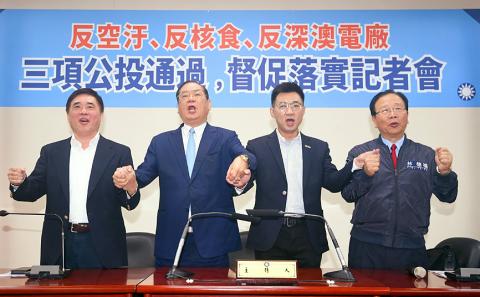The government should start preparing to implement the policies demanded by referendums that passed on Saturday last week, Chinese Nationalist Party (KMT) Vice Chairman and Secretary-General Tseng Yung-chuan (曾永權) said yesterday at an event with sponsors of the KMT-backed referendums.
The party’s politicians proposed referendums on annual cuts to electricity generation at thermal power plants, halting construction or expansion of coal-fired power plants or generators and maintaining a ban on food imports from five Japanese prefectures instituted following the 2011 Fukushima Dai-ichi nuclear power plant disaster.
The three referendums received more “yes” votes than all the ballots cast for KMT candidates in the nine-in-one elections, which showed that the public is interested in the issues, Tseng said.

The KMT would oversee the government, both at the Legislative Yuan and at the local level, to ensure that the referendum results are implemented, Tseng said, adding that the Executive Yuan is responsible for upholding the ban on Japanese food imports.
The referendum is not seeking to restrain Japan, but the Taiwanese government, as the Council of Agriculture and Representative to Japan Frank Hsieh (謝長廷) have been pushing to lift the ban, Tseng said.
KMT Vice Chairman Hau Lung-bin (郝龍斌), initiator of the food ban referendum, said that Taiwan can uphold the ban.
The government has cited a WTO ruling against South Korea’s ban on Japanese food imports in Dispute Settlement 495, but Seoul has continued to enforce the ban, Hau said.
“If South Korea can, so can we,” he said.
KMT Legislator Lin Te-fu (林德福), who initiated the referendum against new coal-fired power plants, said that all referendums supported by the KMT were concerned with people’s health and living standards.
Speaking on behalf of KMT Taichung mayor-elect Lu Shiow-yen (盧秀燕), who proposed the referendum on cutting electricity output from thermal power plants, KMT Policy Committee convener Johnny Chiang (江啟臣) said that it was not a consultation and that the government must take action to realize the results of direct democracy.
“This referendum should not become the most expensive opinion poll [this nation has ever seen],” he said.
Separately yesterday, the Executive Yuan said that it respects the passage of a referendum that asked: Do you agree that subparagraph 1, Article 95 of the Electricity Act (電業法), which reads: “Nuclear-energy-based power-generating facilities shall wholly stop running by 2025,” should be abolished?
However, Executive Yuan spokeswoman Kolas Yotaka said that while the subparagraph has been repealed, the administration’s determination to create a nuclear power-free environment remains unchanged.
Plans to transition to alternative sources of energy would continue as planned, while the government would consider adopting a more flexible energy policy, Kolas said, adding that the goal of a nuclear-free homeland would be realized at a natural and gradual pace.
Additional reporting by Lee Hsin-fang

ANOTHER EMERGES: The CWA yesterday said this year’s fourth storm of the typhoon season had formed in the South China Sea, but was not expected to affect Taiwan Tropical Storm Gaemi has intensified slightly as it heads toward Taiwan, where it is expected to affect the country in the coming days, the Central Weather Administration (CWA) said yesterday. As of 8am yesterday, the 120km-radius storm was 800km southeast of Oluanpi (鵝鑾鼻), Taiwan’s southernmost tip, moving at 9kph northwest, the agency said. A sea warning for Gaemi could be issued tonight at the earliest, it said, adding that the storm is projected to be closest to Taiwan on Wednesday or Thursday. Gaemi’s potential effect on Taiwan remains unclear, as that would depend on its direction, radius and intensity, forecasters said. Former Weather Forecast

As COVID-19 cases in Japan have been increasing for 10 consecutive weeks, people should get vaccinated before visiting the nation, the Centers for Disease Control (CDC) said. The centers reported 773 hospitalizations and 124 deaths related to COVID-19 in Taiwan last week. CDC Epidemic Intelligence Center Director Guo Hung-wei (郭宏偉) on Tuesday said the number of weekly COVID-19 cases reported in Japan has been increasing since mid-May and surpassed 55,000 cases from July 8 to July 14. The average number of COVID-19 patients at Japan’s healthcare facilities that week was also 1.39 times that of the week before and KP.3 is the dominant

The Chinese Communist Party’s (CCP) working group for Taiwan-related policies is likely to be upgraded to a committee-level body, a report commissioned by the Mainland Affairs Council (MAC) said. As Chinese President Xi Jinping (習近平) is increasingly likely to upgrade the CCP’s Central Leading Group for Taiwan Affairs, Taiwanese authorities should prepare by researching Xi and the CCP, the report said. At the third plenary session of the 20th Central Committee of the CCP, which ended on Thursday last week, the party set a target of 2029 for the completion of some tasks, meaning that Xi is likely preparing to

US-CHINA TRADE DISPUTE: Despite Beijing’s offer of preferential treatment, the lure of China has dimmed as Taiwanese and international investors move out Japan and the US have become the favored destinations for Taiwanese graduates as China’s attraction has waned over the years, the Ministry of Labor said. According to the ministry’s latest income and employment advisory published this month, 3,215 Taiwanese university graduates from the class of 2020 went to Japan, surpassing for the first time the 2,881 graduates who went to China. A total of 2,300 graduates from the class of 2021 went to the US, compared with the 2,262 who went to China, the document showed. The trend continued for the class of 2023, of whom 1,460 went to Japan, 1,334 went to